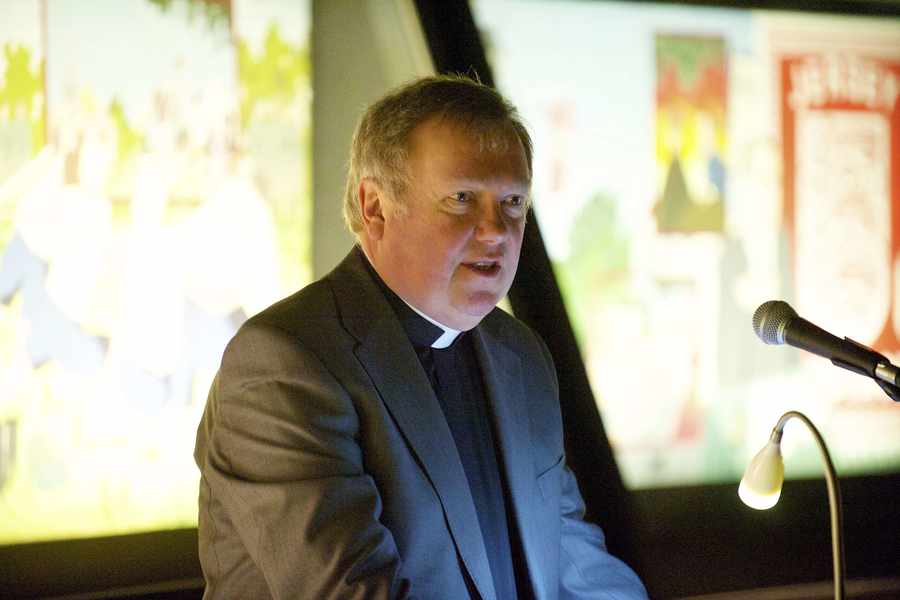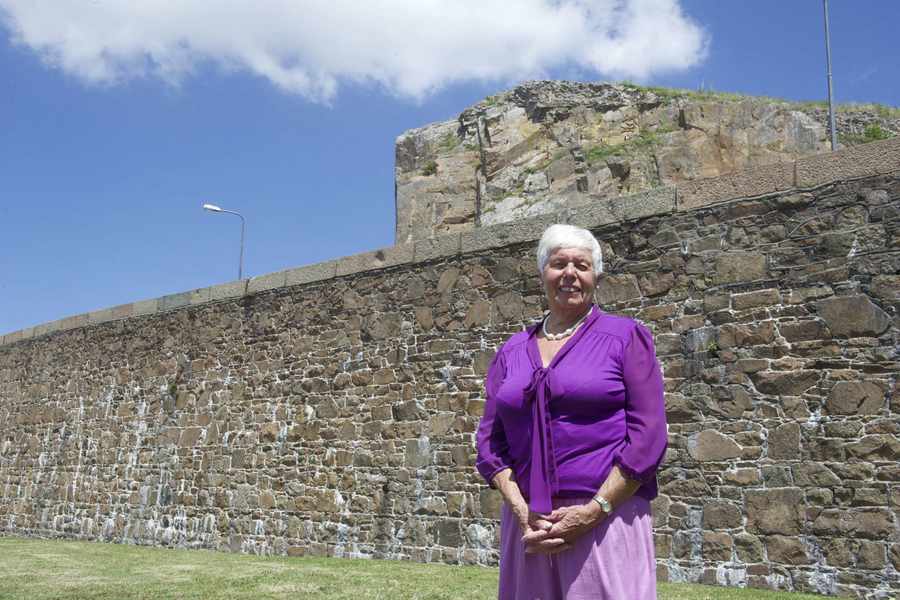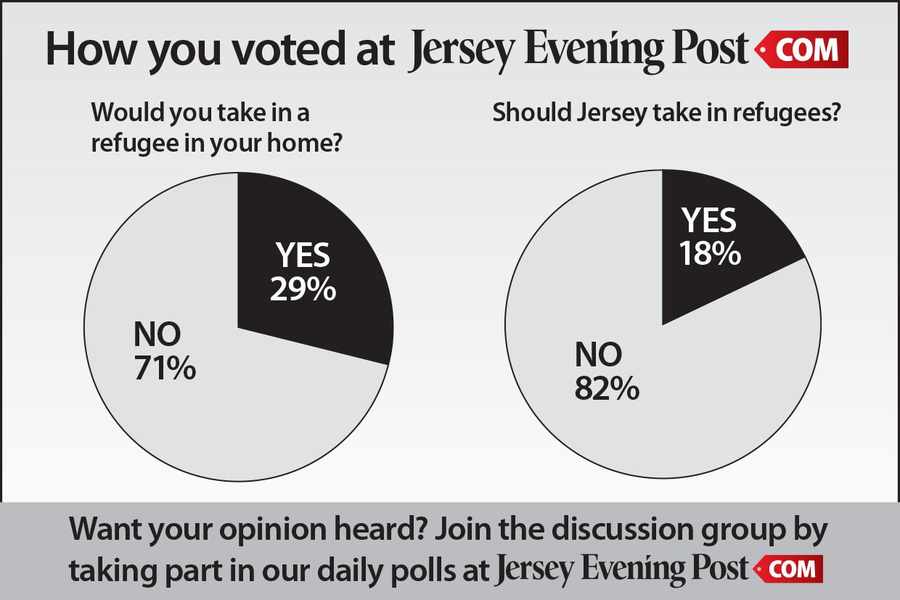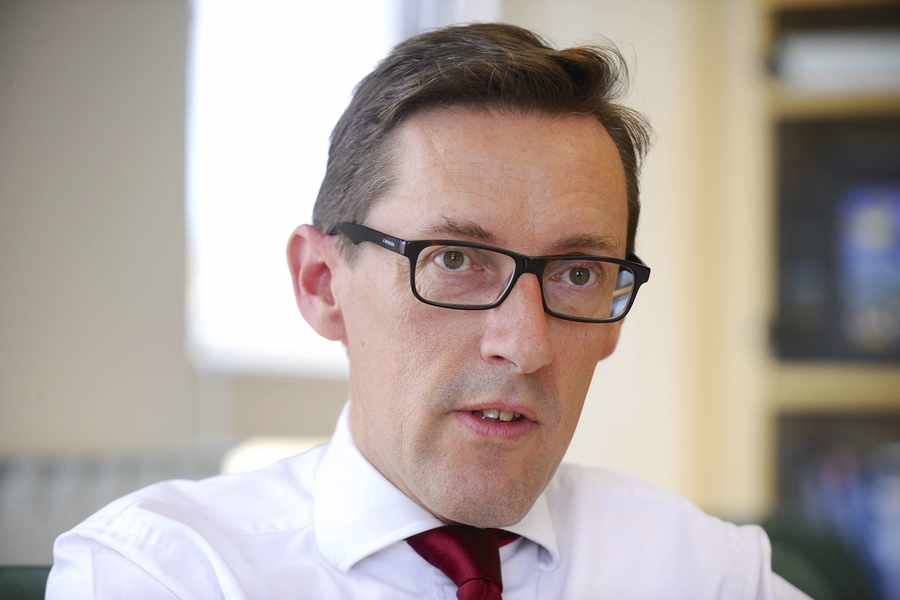- Church leaders support Chief Minister’s pledge for Jersey to explore taking in Syrian refugees
- Dozens of Islanders have critisised the move
- Should Jersey take in refugees – see the results of our online polls below
- Reads the Chief Minister’s address in full below
- Refugees in figures, and the history of refugees in Jersey
CHURCH leaders have united behind the Chief Minister’s pledge for Jersey to explore taking in Syrian refugees – but the move has been criticised by dozens of Islanders who believe the Island is not equipped to take in those who have left their homes behind.
Senator Ian Gorst yesterday told the States Assembly that he and Guernsey Chief Minister Jonathan Le Tocq were ‘determined to do what we can to support the refugee relief effort and have been exploring the possibility of taking some refugee families here in the Channel Islands’.
If the Island was to respond with measures proportionate to the UK – who have offered to take in 20,000 in the next five years – it would offer sanctuary to about 32 people over the same period.
Senator Gorst’s comments have reignited debate about the Island’s position in relation to the refugee crisis as European leaders continue to discuss support plans.
In his announcement, Senator Gorst also revealed that the States are arranging a central refugee fund to collect donations.
The Dean of Jersey, the Very Rev Bob Key, and Reverend Chris Jervis, the Vicar of the Town Church, have welcomed the move and described the desperate situation facing many thousands of people who have left war-ravaged countries as a problem that deserved everybody’s attention as ‘citizens of the world’.

Mr Key said: ‘I think certainly that it is good to see the Council of Ministers taking a lead and fixing to do something.
‘I also think the States has a responsibility to all people in our Island to make sure that whatever we do it’s proportionate and sustainable.
‘It’s also right to say that those who are in camps on the Syrian border represent some of the most persecuted people around – Muslims and Christians – and it’s good to be reaching out to them.’
Mr Key added that there was a delicate balance to be struck and that he hoped to see a mixture of charitable giving from the Island, including from Christian churches, but also from the States too.
‘I think I would say that we have an emergency problem with people in refugee camps living in conditions that we can only imagine,’ he said.
‘Any such situation is always our problem as we are citizens of the world.
‘However, I’m not naïve and unless politicians in Europe and the US look at how to deal with the causes of these problems and the way that states of troubled regions have not been able to deal with the issues, we will only ever have an increasing number of refugees.
‘If we can’t cope now, we certainly won’t be able to cope in three, four or five years’ time.
‘Until the world sorts that out we are only ever going to have a constant refugee crisis.’
Mr Jervis added: ‘I think that Senator Gorst is reflecting the emotional response that the majority will feel towards the plight of the refugees.
‘A sense of compassion is widespread, but the converting of that into a shared and sustainable response is far more difficult.
‘Compassion, and particularly compassion for the marginalised and vulnerable, is a right Christian response.
‘But it is not people of faith alone who feel this – common humanitarian decency cries out for a tangible response at this time.
‘Words and expressions of solidarity are meaningless if they are not backed up by effective action.
‘If taking in some of the refugees into Jersey is the feasible and effective response, then let’s support the efforts of our politicians in making this happen.
‘Of course it will attract some criticism.
‘We can all think of reasons for doing nothing, but that won’t wash when such suffering is evident.’
However, the Chief Minister’s announcement has prompted criticism from some Islanders who have questioned whether Jersey is in a position to offer space to refugees.
Islanders have been quick to voice concerns that the move may not be appropriate while Jersey is attempting to make savings cuts, has a housing shortage and limited space for a rising population.

Jean McLaughlin, who left with her family for the UK shortly before German forces invaded in 1940, is the chairwoman of the Jersey Evacuees Association.
She said that older generations who fought for the Island were being marginalised by States cuts and that the Island may not be able to cope if it opens its doors to refugees.
‘I do feel sorry for these people but I do not feel we can bring them over here,’ she said
‘We have to help our own people who are homeless and have no jobs.
‘We cannot bring any more people into this Island.
‘There’s too many people, and too many cars – this Island is going to sink.
‘By all means help by sending money.
‘I do feel sorry for these people but where are we going to put them?
‘You’d have to have a bigger hospital and bigger schools.
‘It’s very sad, but I don’t think we have the room to bring them over.
‘How can we help more people when there are people in this Island who need help?
‘I don’t know what the solution is.’

What should Jersey be doing to help?
As European governments continue to consider how to approach the growing refugee crisis, the States yesterday waded into the debate. Chief Minister Ian Gorst has directed officers to investigate if the Island can open its doors to some refugee families.
IN announcing steps to explore how Jersey can help the global refugee crisis, Chief Minister Ian Gorst has signalled that the Island is not prepared to watch from the sidelines as other nations find ways to ease the plight of the displaced masses.
Although small by most standard measures – land mass and population – the Island is known for its generosity and is quick to respond in the wake of disasters and suffering.
For many jurisdictions the pledge to help those displaced by war or those who are fleeing persecution comes at a time of fiscal uncertainty. But, as has already been demonstrated by the work of the Jersey Calais Refugee Aid Group, Islanders are prepared to put the needs of others first.
Senator Gorst’s announcement has provoked a swift, strong reaction from the public. Here are a few comments left by JEP readers on our Facebook page:
- Kevin Crowther said: Absolutely we should. Shame on anybody who says no.
- Matthew Peach said: While Im sympathetic to their plight, do we not already have enough issues and bad feeling towards immigration? This Island is too small. And its only getting smaller.
- Carl Stirrup said: Ok, how about this? A limited number of refugee licences (allowing them to work, even if only in selected jobs) matched to volunteer host places, so that those who wish to help can with minimal cost to the States. This is a humanitarian issue rather than an economic one, in my opinion.
- Mandi Jane Corley said: I do feel sorry for them but the Island needs to help the people who are already here with housing etc.
- Craig Roosen said: Yes, show some compassion towards people who are in this desperate situation, disappointed but not surprised by some of the usual xenophobic claptrap that people are posting on here. Some people need to get a grip and look at the bigger picture rather than whining about looking after the locals, whatever that is supposed to mean?
- Tray Nerac Skillen said: No No No, the Island is already over populated, and Jersey people are struggling as it is to find homes, jobs and to live. Where would they live for starters? And how would they live?
GOVERNMENTS across Europe have this week been quantifying the amount of help they are prepared to offer.
Within the past few days Germany, France and Britain have all revealed their hands.
- Despite yesterday saying it could cope with 500,000 refugees for several years, Germany has pledged to take responsibility for 31,000 refugees over the next two years. With a population of more than 81 million this represents a population increase of 0.038 per cent in that period.
- France has offered to support 24,000 refugees over the next two years. This would increase their population of 66.6 million by 0.036 per cent.
- The UK has pledged to take in 20,000 refugees over the next five years. With a population of about 64.5 million that equates to a 0.031 per cent population increase.
- If Jersey were to make an offer that was proportionate to the UKs pledge, the Island would provide room for 32 refugees over the next five years.

In the past few weeks we have witnessed distressing scenes as thousands of people flee desperate situations in their homelands. More than 300,000 people have crossed the Mediterranean to Europe so far this year.
Jersey has a long history of responding generously to humanitarian need and I believe it is right that we do what we can to ease the plight of these refugees, just as we have done in the past. This issue is one of the biggest challenges facing countries across Europe and we all want to see a long-term solution.
As this crisis has been unfolding I have been speaking to my counterpart in Guernsey, Deputy Jonathan Le Tocq, and to our government contacts in the UK. Given the gravity of the situation and the breadth of concern expressed by Islanders, I have felt it necessary to consider what Jersey can do to help.
Deputy Le Tocq and I have agreed that the Channel Islands should contribute in some way to the global refugee response. This would not be a new departure for us as Jersey has already provided aid for Syrian refugees. Deputy Carolyn Labey, who chairs the Jersey Overseas Aid Commission, has confirmed that the Commission has been supporting Syrian refugees since 2013, and has donated £350,000 to date.
In 2013 as millions of Syrian refugees became displaced in Jordan, Lebanon, Turkey and Iraq, the Commission awarded UNICEF £30,000 for medicines and winter clothing, Oxfam £30,000 for food, hygiene kits, clean water and sanitation; and the British Red Cross £30,000 for bedding and family food parcels. A further £60,000 was given to Oxfam for water and sanitation for nearly 600,000 refugees.
By December 2013 the Commission granted another £180,000 to Save the Children, UNICEF, Oxfam and the British Red Cross. In 2014 there were no applications from aid agencies for emergency help, but the Commission provided nearly £20,000 to transport 12,500 winter jackets collected by Headway to Jordan.
The Chief Minister of Guernsey and I are determined to do what we can to support the refugee relief effort. We have signed up to all the relevant conventions and protocols which state that people should claim asylum in the first safe country they reach. We do not have our own asylum processes so anyone eligible to claim asylum who reaches Jersey would be referred to the UK Home Office, where their claim could be processed.
As the UK pursues a comprehensive approach that tackles the causes of the problem as well as the consequences, we have been exploring the possibility of offering homes to some refugee families from the camps on the Syrian borders. Our officials have been liaising with the UK Home Office and will continue to do so over the coming days and weeks.
This process is at an early stage and the precise nature of the support we can offer is still being developed. As Jersey is a small Island we could only accommodate a limited number of refugee families, but I know Islanders would want us to do what we can to help these desperate people and we are establishing a fund into which Islanders can donate to help any families that are accommodated here.
I believe it is important to make clear our willingness to help those in need, not only by continuing to provide aid to the agencies working in the region, but also by looking at what we can do to help here in the Channel Islands. I congratulate those involved in the Jersey Calais Refugee Aid Group but it is also important that we do not undermine the UK’s borders by providing an alternative entry point.
The issue of migrants in Europe is a complex one and it will need to be resolved by combined action from the EU, but we all share a common humanity and I hope we can come together to stand up for our values and play our part in the global refugee response.
Jersey has hosted refugees fleeing political or religious persecution in the past and is perhaps best known in this respect for offering shelter to Charles II and later Victor Hugo.
One of the mass arrivals to the Island came in the 16th century when the Huguenots – members of the Protestant Reformed Church of France, also known as French Calvinists – fled the country during a series of religious persecutions.
The St Bartholomew’s Day massacre in 1572, during which Catholics killed thousands of Huguenots in Paris, plus the withdrawal of a proclamation granting French protestants equality in society led to two main periods of mass exodus from France.
It is estimated that Jersey and Guernsey may have housed several thousand Huguenot refugees during the late 1500s and late 1600s.
Charles II was twice sheltered in the Island during the turbulent years of the Civil War and Jersey went on to become the first place to recognise him as King of England – two gestures for which the Island was rewarded with land and the Royal Mace.
And when Victor Hugo declared Napoleon III a traitor the author clashed with authorities and relocated first to Brussels and then to Jersey, where he was safe.
However, he soon fell out of favour here as well after he supported an Island newspaper that had criticised Queen Victoria. Hugo moved to Guernsey where he lived with his family between 1855 and 1870.
THE mass movement of people displaced by wars raging across north Africa and the Arab world has placed the leaders of European nations at a pivotal moment in world history.
We do not yet know the consequences of responses to this humanitarian crisis now being discussed, but they will have a profound effect of geopolitics and on attitudes towards migrants for many years to come.
The fear felt by many is a fear of uncertainty and chaos in a volatile world.
Strong and clear-headed leadership is needed to steer Europe through these turbulent and troubling waters.
Yesterday, Chief Minister Ian Gorst made a statement in the States against the background of a debate raging fiercely on social media about the rights and wrongs of offering help to migrants.
Today, Senator Gorst delivers an address to the people of this Island explaining what has been done and what the government is doing.
He says that he is working with Guernsey’s Chief Minister, Jonathan Le Tocq, on a Channel Islands response and suggested that Jersey could accommodate a ‘limited number of refugees’.
In his statement on page 4 of today’s paper, the Chief Minister writes: ‘The issue of migrants in Europe is a complex one and it will need to be resolved by combined action from the EU, but we all share a common humanity and I hope we can come together to stand up for our values and play our part in the global refugee response.’
This compassion and understanding tempered with a pragmatic realism is the sort of leadership Jersey needs now.
The Chief Minister and others from across the political spectrum who support a positive response to the crisis must now take the provision-of-aid argument to many in this Island who would rather look the other way.
The results of online JEP polls published today reveal just how difficult that is going to be.
How Jersey helps remains to be seen, but Senator Gorst is investigating what the response should be from an Island which has long gone to the assistance of those in need.
Jersey must act honorably today in accordance with this proud tradition.







